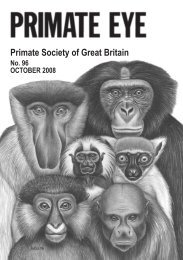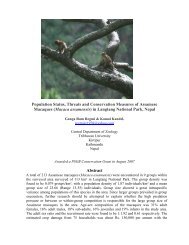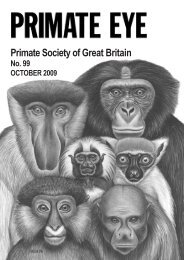2010 Vol 101.pdf (1.63mb) - Primate Society of Great Britain
2010 Vol 101.pdf (1.63mb) - Primate Society of Great Britain
2010 Vol 101.pdf (1.63mb) - Primate Society of Great Britain
You also want an ePaper? Increase the reach of your titles
YUMPU automatically turns print PDFs into web optimized ePapers that Google loves.
REPORT: PSGB Spring Meeting <strong>2010</strong><br />
Social Cognition and Human Evolution<br />
7 th and 8 th April <strong>2010</strong>, University <strong>of</strong> Abertay, Dundee<br />
The University <strong>of</strong> Abertay, Dundee hosted the Spring Meeting <strong>of</strong> the<br />
<strong>Primate</strong> <strong>Society</strong> <strong>of</strong> <strong>Great</strong> <strong>Britain</strong> for the first time in its history. The<br />
conference took place on the 7 th and 8 th <strong>of</strong> April featuring typical Dundee<br />
Spring weather (sunny but cold). Successfully organised by Dr Clare<br />
Cunningham, the meeting consisted <strong>of</strong> 4 invited speakers, 18 pr<strong>of</strong>fered<br />
speakers, 14 poster presentations and a workshop.<br />
Following registration, Abertay Principal and Vice Chancellor Pr<strong>of</strong>essor<br />
Bernard King CBE addressed the delegates, welcoming them to the<br />
University. Clare Cunningham opened the conference and introduced the<br />
chair <strong>of</strong> this first session. Our first invited speaker <strong>of</strong> the conference was<br />
Pr<strong>of</strong>essor Carel Van Schaik from the University <strong>of</strong> Zürich. His talk<br />
concentrated on suggestions that the role <strong>of</strong> cooperative breeding extends<br />
the ‘expensive brain’ framework in human cognitive evolution. This was<br />
followed by talks on social network analysis as a tool to explore the social<br />
structure and cumulative culture in chimpanzees. Morning c<strong>of</strong>fee then gave<br />
us a chance to engage in some social networking <strong>of</strong> our own and the<br />
opportunity to browse the poster presentations.<br />
The second session, chaired by Sean O’Hara, consisted <strong>of</strong> talks based on<br />
social behaviour in the form <strong>of</strong> gestural repertoire in wild chimpanzees, non<br />
linguistic vocal behaviour in human infants and play back calls as a<br />
facilitator <strong>of</strong> increased social affiliation. Everyone then was directed back to<br />
the student centre for lunch (which was excellent), more browsing <strong>of</strong><br />
posters and further opportunity to catch up with colleagues and meet new<br />
members.<br />
Dr Susanne Shultz from the University <strong>of</strong> Oxford was the second invited<br />
speaker <strong>of</strong> the conference and was introduced by chair Sarah Elton.<br />
Susanne’s presentation discussed further evidence illustrating<br />
encephalisation across mammals as a result <strong>of</strong> social bonds and social<br />
stability. This led onto further presentations in the session based on<br />
anatomical and anthropological perspectives on social behaviour. The final<br />
session <strong>of</strong> the day was chaired by Hannah Buchanan-Smith. Invited speaker<br />
Dr James Anderson from the University <strong>of</strong> Stirling presented evidence from<br />
his many years <strong>of</strong> research, on primate self-awareness, empathy and<br />
awareness <strong>of</strong> death. Within his talk a moving piece <strong>of</strong> film was shown<br />
capturing the moments <strong>of</strong> death <strong>of</strong> an old chimpanzee and the reaction <strong>of</strong><br />
others in the group. A wine reception concluded the first part <strong>of</strong> the spring<br />
conference.<br />
3






